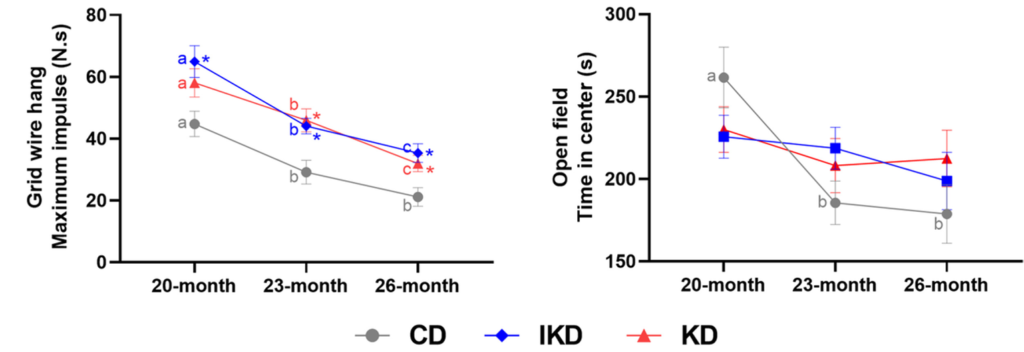Brain-Boosting Ketogenic Diet Wards Off Memory Loss and Anxiety: UC Davis Study
This high-fat, low-carb diet prevents memory decline and anxious behavior in aging mice while reducing inflammation and elevating “good” HDL cholesterol.
Highlights:
- Mice on a standard diet show a decline in memory with age while mice on the ketogenic diet stay sharp.
- The ketogenic diet prevents age-related anxiety-like behavior and increases isometric (without joint movement) strength.
- Inflammation drops and “good” HDL cholesterol rises with the ketogenic diet.
Our cells are naturally adapted to using glucose (from carbohydrates) as their primary fuel source. However, when glucose runs short — as with the ketogenic diet (KD) — our body shifts to producing ketone bodies (from fat). This metabolic shift from glucose to ketones appears to be highly beneficial to the brain, which consumes about 20% of the body’s fuel. Indeed, studies have shown that the KD prevents neurodegeneration in mice.
Now, researchers from the University of California (UC) Davis report in GeroScience that the KD may prevent age-related memory loss. Namely, Zhou and colleagues show that decrements in cognitive performance are deterred by the KD. The KD is also shown to prevent age-related anxiety-like behavior and increase isometric strength. Furthermore, the KD diet was shown to increase total and HDL cholesterol and reduce inflammation.
Ketogenic Diet Prevents Memory Loss and Anxiety while Reducing Inflammation
Zhou and colleagues compared a standard ketogenic diet (KD) — followed daily — to an intermittent ketogenic diet (IKD) — followed for 3 consecutive days of the week. It was found that the KD diet prevented an age-related drop in cognitive performance, which occurred in mice on a standard high-carbohydrate control diet (CD). Such cognitive performance was assessed through a series of learning and memory tests used to calculate a cognitive score. Like the KD, the IKD prevented age-related memory loss, albeit with lower cognitive scores.

By examining body composition, the researchers found that the KD increased fat mass compared to the CD. However, whole-body lean mass was not significantly changed. Still, the calf (gastrocnemius) muscle of KD mice had more mass than mice on the CD. Previous findings have shown that the KD reduces fat mass and preserves lean mass. It is unclear why Zhou and colleagues observed an increase in fat mass.
All mice showed an age-dependent decline in isometric strength, measured by how long the mice could hang upside-down from a wire. However, compared to mice on the CD, mice on the KD or IKD were able to resist falling from the wire for a longer time. In humans, this type of (isometric) strength has implications for improved posture, balance and coordination. Grip strength and locomotor activity were also measured, but were found not to be different between dietary interventions.
Anxiety was measured by placing the mice in the center of an open field. Mice leaving the center of the field to the sidelines were considered more anxious. The CD mice showed an age-dependent increase in anxiety-like behavior. This age-dependent increase in anxiety-like behavior was not observed in the KD or IKD mice, suggesting the KD can prevent anxiety.

A blood panel was measured from all mice to determine the effects of the KD on inflammation and metabolism. A pro-inflammatory marker called IL-6 was decreased in both KD and IKD mice compared to CD mice at 27 months of age, indicating reduced inflammation. Additionally, total cholesterol and HDL cholesterol levels were higher in KD mice, while “bad” LDL cholesterol was not changed.
These findings suggest that improvements in memory, isometric strength, and mood could be due to reduced inflammation. Additionally, the KD does not appear to harm cholesterol levels, but may potentially improve them, despite the high saturated fat (in the form of lard) consumed by KD mice. High HDL levels have been associated with reduced heart disease and stroke risks.

Ketogenic Diet: Good for the Brain, Bad for the Body?
A recent study showed that a KD shortens lifespan unless mice were supplemented with β-hydroxybutyrate, a ketone. Still, another study showed that a life-long KD did not shorten or extend lifespan. However, another study showed that a KD increases the median lifespan of male mice by 13.6%. In this latter study, mice were calorie-restricted, which likely contributes to increased lifespan. It’s possible that the KD only extends lifespan when combined with caloric restriction, which is the most robust life-extending intervention in mice.
In the current study, the CD contained (as % total calories) 10% protein, 74% carbs, and 16% fat. The KD contained 10% protein, less than 5% carbs, and 89.5% fat from lard. While lifespan was not measured, the KD led to improvements in memory and mood, supporting the notion that the KD protects the brain from age-related decline. Whether the KD extends or shortens the lifespan of mice without caloric restriction remains unclear.
Model: 18-month-old male C57BL/6JN mice
Dosage: Ketogenic diet (every day of the week) or intermittent ketogenic diet (3 consecutive days of week): 10% protein, less than 5% carbohydrates, and 89.5% fat from animal fat (lard) for 9 months.

